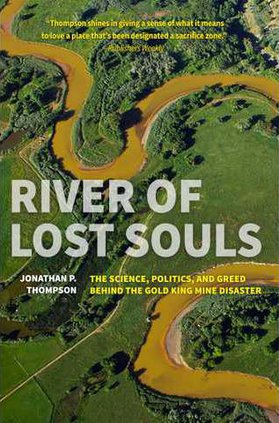"RIVER OF LOST SOULS: The Science, Politics, and Greed Behind the Gold King Mine Spill," by Jonathan Thompson, Torrey House Press, 275 pages (nf)Plenty has been written about the very small world of a mining town and the very broad reach of a beleaguered industry. From Loretta Lynns iconic song "Coal Miners Daughter," to the 2010 nail-biting coverage of 33 trapped Chilean miners, to the hit Broadway musicals "Paint Your Wagon" and "Billy Elliot," mining is a global story, and its one of heartbreak, hard work and hard times.
Jonathan Thompsons "River of Lost Souls" examines the many facets of risk involved in taking resources from below the earths surface. An environmental journalist, Thompson has reported on southwest Colorado for over 20 years. This book is special, however, because the Four Corners area of Colorado is his current and ancestral home. Thompson is writing about minings ecological, social, financial and political impact on his land, his landscape, his water, his people. That makes "River of Lost Souls" more than a regular reporting job.
Thompson begins with the
Gold King Mine wastewater disaster of 2015, which the EPA caused while attempting to drain water near the mines entrance. The spill sent 3 million gallons of waste and tailings into Cement Creek, a tributary of the Animas River and part of the San Juan River watershed which drains into the Colorado, affecting the Utah, Colorado and New Mexico parts of that watershed as well as the Navajo Nation.
From there, Thompson jumps into far stretches of time to 1765, when a Spanish explorer named the Animas River; to 10,000 years earlier, when Paleo-Indians roamed the rivers valley; to the meridian of time, when the ancestors of the Zuni, Hopi and Rio Grande Pueblo people inhabited the land for 500 years; to the mid-1800s and the Swedes who came to Silverton, Colorado, to mine.
Its a grand scope, but telling any story of landscape is telling a very grand story.
It also makes a complex story difficult to follow. Thompsons time warps are important, but they are jarring. His time jumps need clear dates, and Thompson doesnt always make them available. A map would also be useful. Thompsons writing is good, but his sentences can be dense and require readers to do their own mining for the riches the writing embeds. The work is worthwhile, however, as there are many moving parts in any story about mines land, culture, policy, history, money, inevitable disaster and Thompson works to examine all of them.
"River of Lost Souls" is a thoughtful read, but not a quick one. Because Thompsons writings come from 20 years of his newspaper reports, the overall feeling can be disjointed and sparse, which is distracting if one is expecting to follow a tenable thread. This is not a typical narrative with a cast of characters and a traditional story arc. Readers should approach this text as the investigation it is: puzzle pieces of a larger-than-life story that is eons old. If you are the kind of reader who wants it laid out cleanly, this is not that book. But, to Thompsons point, nothing is clean about mining that has never been the case.
Thompsons best writing is in his descriptions of people and places. His telling of how he came to Silverton is familiar and engaging. If readers approach the book with care and attention, they will be rewarded with savoring these descriptive passages when they happen.




